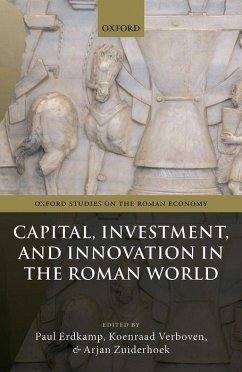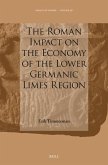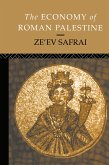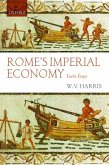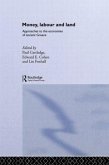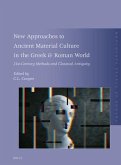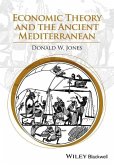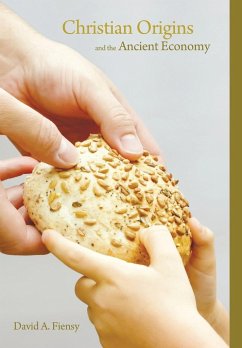Capital, Investment, and Innovation in the Roman World
Herausgeber: Erdkamp, Paul; Zuiderhoek, Arjan; Verboven, Koenraad
Schade – dieser Artikel ist leider ausverkauft. Sobald wir wissen, ob und wann der Artikel wieder verfügbar ist, informieren wir Sie an dieser Stelle.
Capital, Investment, and Innovation in the Roman World
Herausgeber: Erdkamp, Paul; Zuiderhoek, Arjan; Verboven, Koenraad
- Gebundenes Buch
- Merkliste
- Auf die Merkliste
- Bewerten Bewerten
- Teilen
- Produkt teilen
- Produkterinnerung
- Produkterinnerung
Investment in capital and innovation in its uses are often considered the linchpin of modern economic growth, but has this always been so? This volume aims to shed new light on the ancient Roman economy in the first book-length contribution focusing on the allocation and uses of capital and credit and the role of innovation in the Roman world.
Andere Kunden interessierten sich auch für
![The Roman Impact on the Economy of the Lower Germanic Limes Region The Roman Impact on the Economy of the Lower Germanic Limes Region]() Erik TimmermanThe Roman Impact on the Economy of the Lower Germanic Limes Region147,99 €
Erik TimmermanThe Roman Impact on the Economy of the Lower Germanic Limes Region147,99 €![The Economy of Roman Palestine The Economy of Roman Palestine]() Ze'Ev SafraiThe Economy of Roman Palestine173,99 €
Ze'Ev SafraiThe Economy of Roman Palestine173,99 €![Rome's Imperial Economy Rome's Imperial Economy]() W V HarrisRome's Imperial Economy222,99 €
W V HarrisRome's Imperial Economy222,99 €![Money, Labour and Land Money, Labour and Land]() Paul Cartledge / Edward E. Cohen (eds.)Money, Labour and Land172,99 €
Paul Cartledge / Edward E. Cohen (eds.)Money, Labour and Land172,99 €![New Approaches to Ancient Material Culture in the Greek & Roman World New Approaches to Ancient Material Culture in the Greek & Roman World]() New Approaches to Ancient Material Culture in the Greek & Roman World134,99 €
New Approaches to Ancient Material Culture in the Greek & Roman World134,99 €![Economic Theory and the Ancient Mediterranean Economic Theory and the Ancient Mediterranean]() Donald W. JonesEconomic Theory and the Ancient Mediterranean212,99 €
Donald W. JonesEconomic Theory and the Ancient Mediterranean212,99 €![Christian Origins and the Ancient Economy Christian Origins and the Ancient Economy]() David A FiensyChristian Origins and the Ancient Economy37,99 €
David A FiensyChristian Origins and the Ancient Economy37,99 €-
-
-
Investment in capital and innovation in its uses are often considered the linchpin of modern economic growth, but has this always been so? This volume aims to shed new light on the ancient Roman economy in the first book-length contribution focusing on the allocation and uses of capital and credit and the role of innovation in the Roman world.
Produktdetails
- Produktdetails
- Verlag: Oxford University Press (UK)
- Seitenzahl: 508
- Erscheinungstermin: 18. März 2020
- Englisch
- Abmessung: 240mm x 164mm x 35mm
- Gewicht: 1024g
- ISBN-13: 9780198841845
- ISBN-10: 0198841841
- Artikelnr.: 58306715
- Herstellerkennzeichnung
- Libri GmbH
- Europaallee 1
- 36244 Bad Hersfeld
- gpsr@libri.de
- Verlag: Oxford University Press (UK)
- Seitenzahl: 508
- Erscheinungstermin: 18. März 2020
- Englisch
- Abmessung: 240mm x 164mm x 35mm
- Gewicht: 1024g
- ISBN-13: 9780198841845
- ISBN-10: 0198841841
- Artikelnr.: 58306715
- Herstellerkennzeichnung
- Libri GmbH
- Europaallee 1
- 36244 Bad Hersfeld
- gpsr@libri.de
Paul Erdkamp is Professor of Ancient History at the Vrije Universiteit Brussel, where he has taught since 2007. He studied history at the Radboud University of Nijmegen, obtaining his PhD in 1998, before holding teaching posts at the universities of Edinburgh, Utrecht, and Nijmegen and a research fellowship at Leiden University. He is co-director with Koenraad Verboven of the Roman Society Research Centre (Ghent/Brussels) and general editor of the Palgrave Studies in Ancient Economies series, and has published widely on the Roman economy, the Roman army, and Roman Republican historiography. Koenraad Verboven is Professor of Ancient History at Ghent University, where he has taught since 2007. He specializes in ancient social and economic history, particularly of the Roman world, and has a special interest in monetary history and numismatics, friendship and patronage based networks, guilds (collegia), (neo-)institutional analysis, and complexity economics. He is the author of The Economy of Friends: Economic Aspects of Amicitia and Patronage in the Late Republic (Peeters, 2002), for which he was awarded the 'Prix Joseph Gantrelle' of the Belgian Royal Academy. Arjan Zuiderhoek is Professor of Ancient History at Ghent University, where he has taught since 2008. He studied Greek and Roman history at the University of Groningen and the University of Cambridge and obtained his PhD at the University of Groningen in 2006 before taking up positions as Junior Research Fellow and Director of Studies in Classics at Homerton College, University of Cambridge and, subsequently, Postdoctoral Research Fellow at Ghent University. He is the author of The Politics of Munificence in the Roman Empire: Citizens, Elites and Benefactors in Asia Minor (CUP, 2009) and The Ancient City (CUP, 2017).
* Frontmatter
* List of Figures
* List of Tables
* List of Abbreviations
* List of Contributors
* 1: Paul Erdkamp, Koenraad Verboven, and Arjan Zuiderhoek:
Introduction
* I. Investment and Innovation
* 2: Paul Erdkamp: Population, Technology, and Economic Growth in the
Roman World
* 3: Cristiano Viglietti: Innovations and Uses of Wealth in Archaic
Rome and Latium (Late Eighth to Early Fourth Century BC)
* 4: Wim Broekaert and Arjan Zuiderhoek: Capital Goods in the Roman
Economy
* 5: Andrew Wilson: Roman Water-Power: Chronological Trends and
Geographical Spread
* 6: Nicolas Monteix: The Archaeological Perception of Capital and its
Transformations in Urban Occupations
* II. Capital and Investment in the Rural Economy
* 7: Marguerite Ronin: Funding Irrigation: Between Individual and
Collective Investments
* 8: Mick Stringer: Impensae, operae, and the pastio uillatica: The
Evaluation of New Venture Investments in the Roman Agricultural
Treatises
* 9: Annalisa Marzano: A Story of Land and Water: Control, Capital, and
Investment in Large-Scale Fishing and Fish-Salting Operations
* 10: Tamara Lewit: Invention, Tinkering, or Transfer? Innovation in
Oil and Wine Presses in the Roman Empire
* III. Human Capital, Financial Capital, and Credit Markets
* 11: Norman Underwood: Labouring for God: The Clergy and Human Capital
in the Later Roman Empire
* 12: Koenraad Verboven: Capital Markets and Financial Entrepreneurs in
the Roman World
* 13: Jean Andreau: Capital and Investment in the Campanian Tablets
* 14: Merav Haklai: Credit and Financial Capital in Roman Egypt
* 15: Leonardo Gregoratti: Temples and Traders in Palmyra
* Endmatter
* Index
* List of Figures
* List of Tables
* List of Abbreviations
* List of Contributors
* 1: Paul Erdkamp, Koenraad Verboven, and Arjan Zuiderhoek:
Introduction
* I. Investment and Innovation
* 2: Paul Erdkamp: Population, Technology, and Economic Growth in the
Roman World
* 3: Cristiano Viglietti: Innovations and Uses of Wealth in Archaic
Rome and Latium (Late Eighth to Early Fourth Century BC)
* 4: Wim Broekaert and Arjan Zuiderhoek: Capital Goods in the Roman
Economy
* 5: Andrew Wilson: Roman Water-Power: Chronological Trends and
Geographical Spread
* 6: Nicolas Monteix: The Archaeological Perception of Capital and its
Transformations in Urban Occupations
* II. Capital and Investment in the Rural Economy
* 7: Marguerite Ronin: Funding Irrigation: Between Individual and
Collective Investments
* 8: Mick Stringer: Impensae, operae, and the pastio uillatica: The
Evaluation of New Venture Investments in the Roman Agricultural
Treatises
* 9: Annalisa Marzano: A Story of Land and Water: Control, Capital, and
Investment in Large-Scale Fishing and Fish-Salting Operations
* 10: Tamara Lewit: Invention, Tinkering, or Transfer? Innovation in
Oil and Wine Presses in the Roman Empire
* III. Human Capital, Financial Capital, and Credit Markets
* 11: Norman Underwood: Labouring for God: The Clergy and Human Capital
in the Later Roman Empire
* 12: Koenraad Verboven: Capital Markets and Financial Entrepreneurs in
the Roman World
* 13: Jean Andreau: Capital and Investment in the Campanian Tablets
* 14: Merav Haklai: Credit and Financial Capital in Roman Egypt
* 15: Leonardo Gregoratti: Temples and Traders in Palmyra
* Endmatter
* Index
* Frontmatter
* List of Figures
* List of Tables
* List of Abbreviations
* List of Contributors
* 1: Paul Erdkamp, Koenraad Verboven, and Arjan Zuiderhoek:
Introduction
* I. Investment and Innovation
* 2: Paul Erdkamp: Population, Technology, and Economic Growth in the
Roman World
* 3: Cristiano Viglietti: Innovations and Uses of Wealth in Archaic
Rome and Latium (Late Eighth to Early Fourth Century BC)
* 4: Wim Broekaert and Arjan Zuiderhoek: Capital Goods in the Roman
Economy
* 5: Andrew Wilson: Roman Water-Power: Chronological Trends and
Geographical Spread
* 6: Nicolas Monteix: The Archaeological Perception of Capital and its
Transformations in Urban Occupations
* II. Capital and Investment in the Rural Economy
* 7: Marguerite Ronin: Funding Irrigation: Between Individual and
Collective Investments
* 8: Mick Stringer: Impensae, operae, and the pastio uillatica: The
Evaluation of New Venture Investments in the Roman Agricultural
Treatises
* 9: Annalisa Marzano: A Story of Land and Water: Control, Capital, and
Investment in Large-Scale Fishing and Fish-Salting Operations
* 10: Tamara Lewit: Invention, Tinkering, or Transfer? Innovation in
Oil and Wine Presses in the Roman Empire
* III. Human Capital, Financial Capital, and Credit Markets
* 11: Norman Underwood: Labouring for God: The Clergy and Human Capital
in the Later Roman Empire
* 12: Koenraad Verboven: Capital Markets and Financial Entrepreneurs in
the Roman World
* 13: Jean Andreau: Capital and Investment in the Campanian Tablets
* 14: Merav Haklai: Credit and Financial Capital in Roman Egypt
* 15: Leonardo Gregoratti: Temples and Traders in Palmyra
* Endmatter
* Index
* List of Figures
* List of Tables
* List of Abbreviations
* List of Contributors
* 1: Paul Erdkamp, Koenraad Verboven, and Arjan Zuiderhoek:
Introduction
* I. Investment and Innovation
* 2: Paul Erdkamp: Population, Technology, and Economic Growth in the
Roman World
* 3: Cristiano Viglietti: Innovations and Uses of Wealth in Archaic
Rome and Latium (Late Eighth to Early Fourth Century BC)
* 4: Wim Broekaert and Arjan Zuiderhoek: Capital Goods in the Roman
Economy
* 5: Andrew Wilson: Roman Water-Power: Chronological Trends and
Geographical Spread
* 6: Nicolas Monteix: The Archaeological Perception of Capital and its
Transformations in Urban Occupations
* II. Capital and Investment in the Rural Economy
* 7: Marguerite Ronin: Funding Irrigation: Between Individual and
Collective Investments
* 8: Mick Stringer: Impensae, operae, and the pastio uillatica: The
Evaluation of New Venture Investments in the Roman Agricultural
Treatises
* 9: Annalisa Marzano: A Story of Land and Water: Control, Capital, and
Investment in Large-Scale Fishing and Fish-Salting Operations
* 10: Tamara Lewit: Invention, Tinkering, or Transfer? Innovation in
Oil and Wine Presses in the Roman Empire
* III. Human Capital, Financial Capital, and Credit Markets
* 11: Norman Underwood: Labouring for God: The Clergy and Human Capital
in the Later Roman Empire
* 12: Koenraad Verboven: Capital Markets and Financial Entrepreneurs in
the Roman World
* 13: Jean Andreau: Capital and Investment in the Campanian Tablets
* 14: Merav Haklai: Credit and Financial Capital in Roman Egypt
* 15: Leonardo Gregoratti: Temples and Traders in Palmyra
* Endmatter
* Index

